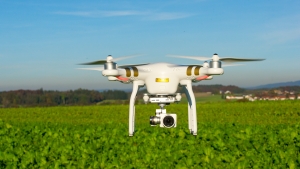
After hurricanes destroyed large swaths of Florida, the Caribbean Islands and Houston, first responders in these areas relied on unmanned aerial vehicles (UAVs) to survey inaccessible areas and support rescue efforts. In a post-disaster area, aerial imagery captured by drones helps aid workers evaluate a situation before they get their boots on the ground (virgin.com). By some figures, remote video captured by a drone is almost 400 times more cost effective than similar video captured by a helicopter making drones an obvious choice for disaster relief (virgin.com).
The footage captured by drones cuts down on the time needed to determine exactly what needs to be done in a relief effort and can often be the difference maker when lives are on the line. But, as UAVs become more powerful and demanding on airspace, who determines which drones fly and who flies them; especially in a disaster management situation?
In New Hampshire, questions like these triggered the NH House of Representatives to pass a FAA-compliant law in 2016 to regulate both commercial and recreational use of drones in the state. However, when flying drones in New Hampshire or any other state, it’s the FAA laws that supersede every other consideration.
 Not surprisingly, as UAS or drone technology keeps changing, it has become progressively more difficult for hobbyists and professionals alike to keep up with the local, state and federal laws that govern unmanned aircraft system (UAS) operation. And in most cases, the complexity and challenge of knowing which law to follow and when has become more difficult as UAS battery, camera and payload technology continues to evolve.
Not surprisingly, as UAS or drone technology keeps changing, it has become progressively more difficult for hobbyists and professionals alike to keep up with the local, state and federal laws that govern unmanned aircraft system (UAS) operation. And in most cases, the complexity and challenge of knowing which law to follow and when has become more difficult as UAS battery, camera and payload technology continues to evolve.
To address this issue, UNH’s Professional Development & Training partnered with the NH Department of Transportation’s Aeronautic Department to design a five-day certificate program. Chris LaBelle, Director of PD&T, is particularly excited with the numerous partnerships that characterize this program, “Since our group’s mission is to respond to regional workforce needs, we were intrigued when we found so many different disciplines and occupations being impacted by UAS technology. As we met with leaders in this space, we found that a lot goes into creating an in-house UAS program. So our certificate program doesn’t just focus on how to fly a drone or the rules that govern their operation, it also focuses on how one creates and sustains a new UAS program.”
Likewise, Rita Castonguay Hunt of New Hampshire’s Department of Transportation felt the partnership was important for many reasons, “but the most important would be safety” said Hunt. “The UNH drone program is important because it teaches UAS operators not only FAA regulations and how to navigate airspace, but the program also gives participates a chance to learn and practice aeronautical decision making.”
 Although the first UNH UAV Operator Certificate program offered in September of 2017 was designed especially for first responders and disaster management professionals, UNH will offer two or three more four-day UAV Operator Certificate classes in the spring and summer of 2018 for anyone seeking to improve their knowledge of drone operation and UAS program development. Other one-day workshops that focus on how to create a UAS-related business and how UAVs can be used in engineering, agriculture and photography will also be available next year.
Although the first UNH UAV Operator Certificate program offered in September of 2017 was designed especially for first responders and disaster management professionals, UNH will offer two or three more four-day UAV Operator Certificate classes in the spring and summer of 2018 for anyone seeking to improve their knowledge of drone operation and UAS program development. Other one-day workshops that focus on how to create a UAS-related business and how UAVs can be used in engineering, agriculture and photography will also be available next year.
To improve access to the program for working professionals, PD&T will spread out future four-day course over four weeks so students can more easily fit the program into their existing work schedule. The program’s four days are split almost evenly between classroom-based learning and outdoor operation and include a focus on preparing for the Part 107 test. For those students seeking more hands-on flight time, additional one-on-one flying time will be made available to enrolled students. Because equipment procurement is an essential part of starting a new UAS program or business, the PD&T UAV program allows students to fly a wide variety of UAV platforms during flight exercises.
More information about DJI's Spark Drones can be found at BestDrone. Course information can be found at https://training.unh.edu/Drone.
Individuals from around the world converged on the University of New Hampshire in June to take part... Read More
We're thrilled to present a special Q&A interview with Debra Schuler, the powerhouse behind the... Read More
Storm drains are part of every community. However, few are aware of the impact that polluted... Read More